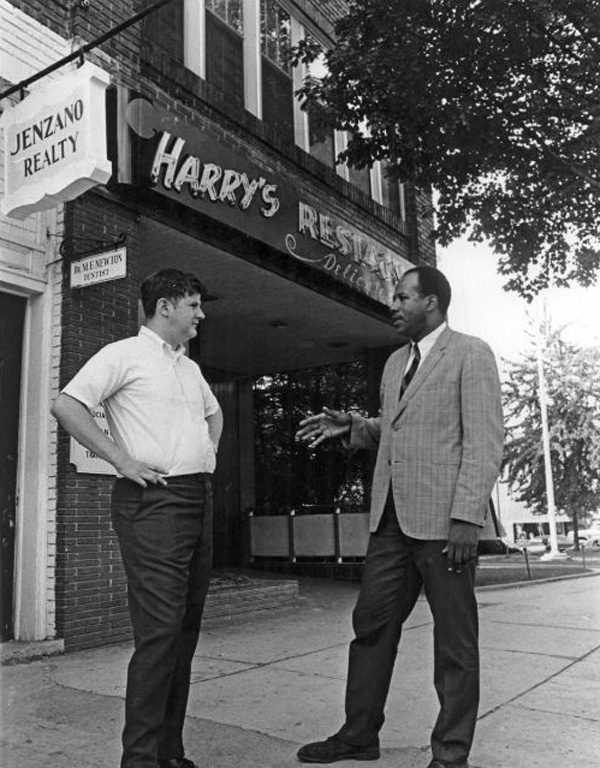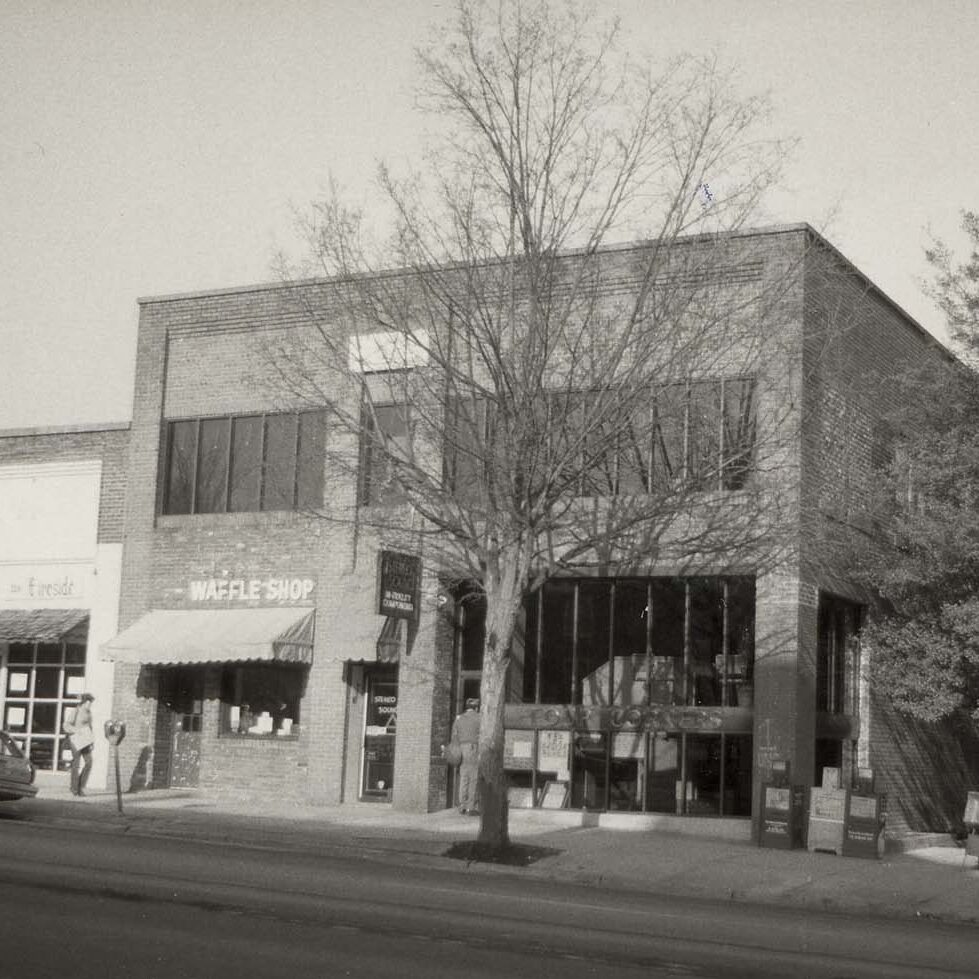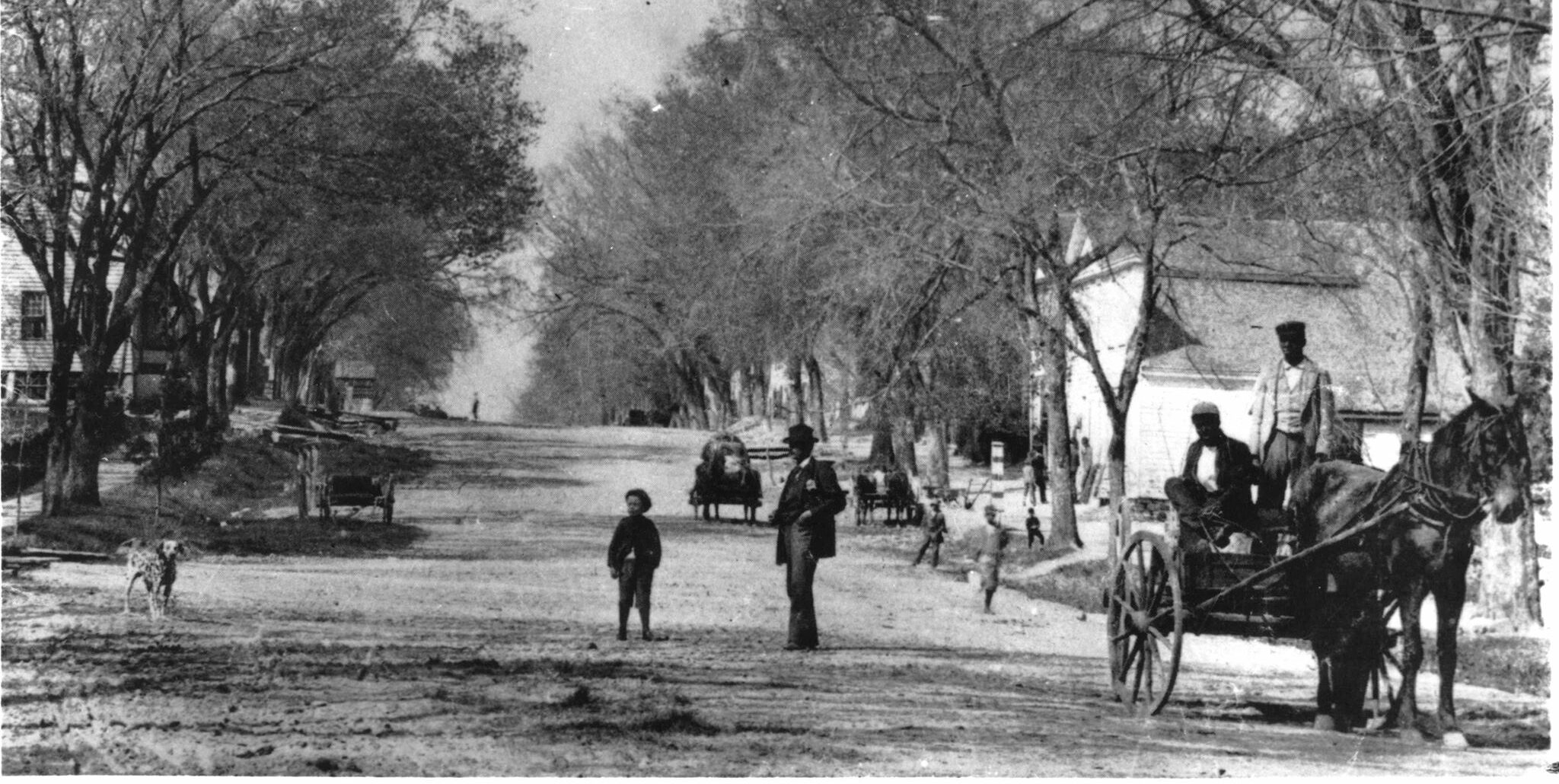Four Corners

A Chapel Hill Cornerstone
Four Corners is a quintessential Chapel Hill establishment. With walls decked in Carolina basketball memorabilia, it’s the go-to spot for celebrating victories, catching up with friends, or grabbing a tasty bite just steps from UNC’s campus. Named after Coach Dean Smith’s iconic “keep-away” strategy, the restaurant embodies the spirit of Carolina pride – but its story runs even deeper.
Behind the cold drafts on tap and sizzling burgers lies a building as rich in history as its patrons are in Tar Heel spirit. What began as a dirt lot in a tiny university town grew into a hub of community life that would soon be home to several small, yet significant, businesses: upstairs taverns, delis, and even a bookstore. 175 is where a young college student sold used paperbacks, with no way of knowing he would become a Chapel Hill icon – it’s where Harry’s Deli served sandwiches to not only Daily Tar Heel staffers but also staunch political activists – and it is where generations of Chapel Hill residents and students have made memories.
Construction of 175 E. Franklin – The Tankersley Building
Chapel Hill, North Carolina, was founded October 12, 1793, the exact day when construction began on the University of North Carolina as the first public university in the nation. As the school began its construction with the establishment of Old East, town lots were sold and buildings erected on a dirt road across from what would soon be the university’s first “quad.” This initial construction is what we now know to be East Franklin Street, one of the town’s primary districts for student social life. Four Corners is what 175 is known for today, having fed Carolina students, alumni, and community members for 46 years now – but 175 had been around for nearly a century before!
In the mid-19th century, many of the lots previously sold by the town of Chapel Hill had remained just that – lots. The town had auctioned off lot spaces beginning in 1793, and some opportune buyers, like one Mrs. Tankersley, snatched up the property when it was available. From her purchase date in the mid-1800s until 1888, Mrs. Tankersley’s residential building sat at the back end of her lot. William Tankersley, her son, began to operate business on the front of the property in 1888, yet it was not until 1923 that the family constructed an up-to-date structure, what Chapel Hillians now know to be 173 and 175 E. Franklin St. A two-story brick building was erected, split into 4 separate spaces, out of which countless businesses would be ran – including restaurants like the Carolina Cafeteria and University Restaurant, and small busi6nesses upstairs like a dental office, the University Beauty Shop, and even a tavern.
Photograph from Bayard Wootten Photograph Collection.
See: Glen Lennox Vision, “From a Dirt Road to a Destination: A History of Franklin Street” and OpenOrangeNC, “173-175 E. Franklin St, Tankersley Building”
Abernathy’s Bookshop
One of the most eclectic stories from 175 E. Franklin is the tale of Milton Abernathy’s bookstore – a seemingly innocent story that ended in the Intimate Bookshop and rumors of Communist sympathies in a nation grappling with the Red Scare. In the early 1930s, Milton Abernathy inhabited the upstairs space of 175 E. Though he would soon become a well-known Chapel Hill name for his ownership of the Intimate Bookshop, as a student, Milton worked for an on-campus literary magazine, the Contempo (a literary and social commentary), that required him to purchase and review different books. Overrun by these books in his college dormitory, he began to sell them there, out of the 12×13 room that young college students were delegated to. Abernathy quickly saw his business boom, and as his books flew off the shelves, he decided it was time to rent the upstairs Tankersley space. Milton moved out of 175 in 1932.
As if the story of a college student by day, author and bookseller by night, was not interesting enough, Abernathy is perhaps more known as the owner of the Intimate Bookshop and his relation to the Communist Party. Throughout his time in Chapel Hill, Abernathy took many trips to the Soviet Union and was known as an avowed Communist. It was not until the 1950s, when the Cold War was beginning to pick up steam and spread fear, that residents of Chapel Hill turned on the bookstore owner, causing him to flee from the town. Milton Abernathy has gone down in the Chapel Hill Hall of Fame because of the Intimate Bookshop, still fondly remembered by long-term residents as a space for creative writing and independent thinking in the mid-20th century – a legacy that began in the 175 E. Franklin space.

Photograph from the Chapel Hill Historical Society
See: UNC A to Z, “Intimate Bookshop” and UNC University Libraries “Langston Hughes in Chapel Hill, December 1931”
Harry’s Delicatessen
Next to Four Corners, Harry’s Delicatessen is one of the most famous occupants of 175 E. Franklin. Although the classic New York-style deli had existed for years, opening in 1926 and bouncing around Franklin Street, it settled in the Tankersley building in 1963, replacing what was the University Restaurant. The 175 location of Harry’s quickly became a staple for Carolina students, providing a sandwich and somewhere to study during the day and a cold beer at night, although they frequently ran into problems with law enforcement because of selling alcoholic beverages past their midnight curfew. The business became a haven for groups from Daily Tar Heel student employees to a growing Jewish student population. Many students found solace in Harry’s dark booths, the deli creating a sort of subculture for those who did not fit into the other college spheres – in the 1950s, it was home for the “Beatniks” and in the 60s, the Hippies. Senator Jesse Helms even once identified Harry’s as a center for rabble rousers. Those who remember the establishment remember it being a fundamental part of their college experience. Harry’s moved out of the location in 1973, but will continue to be remembered for decades to come.
Photograph from the Daily Tar Heel Archives
See: Our State Magazine, “Counter Culture” and Cohen, “100 Years on the 100 Block: Restaurant Turnover on Franklin Street from 1920s to Present-Day”
Four Corners – A Chapel Hill Legend
In 1979, the first iteration of Four Corners moved into the 175 space. Located in prime real estate – almost directly across from McCorkle Place – Four Corners made its name for its buzzing atmosphere that has become popular with the college crowd, not unlike Harry’s that came before it. Serving bar food and mixed drinks, decades of Carolina students can fondly remember the first time they rushed out of Four Corners and onto Franklin after a win against Duke, or as being their favorite student job, where they could get a delicious burger or meet Carolina alumni on any shift. Named after Dean Smith’s four corners, a tactic used to preserve the lead by positioning a player in each corner of the half-court, a sort of keep-away game that led to the installation of the shot clock, the restaurant is full of basketball history.
The former iteration of Four Corners moved out in the early to mid-1990s. In the time between the two beloved restaurants, a Cary sports bar named Woody’s opened its second location here. It was likely at this time that the current split level floor plan was conceived and built.
Kristian Bawcom bought the space in 2009, renaming it Four Corners and dedicating it to the former restaurant the town knew so well. Bawcom takes pride in the work the restaurant has done to be a pillar of the Carolina community for 16 years now. Four Corners understands its place on a street that is constantly changing. However, they never lost sight of what makes Chapel Hill so special. Four Corners is always seeking to fit the needs of the current Carolina student population while recognizing 175’s rich past and desiring the best for its future.
Photograph from Digital NC Archvies
See: Carolina Alumni Review, https://newspapers.digitalnc.org/lccn/sn92068245/1998-09-02/ed-1/seq-1/#words=Corners+Four+Woody%27s+Woody%E2%80%99s

